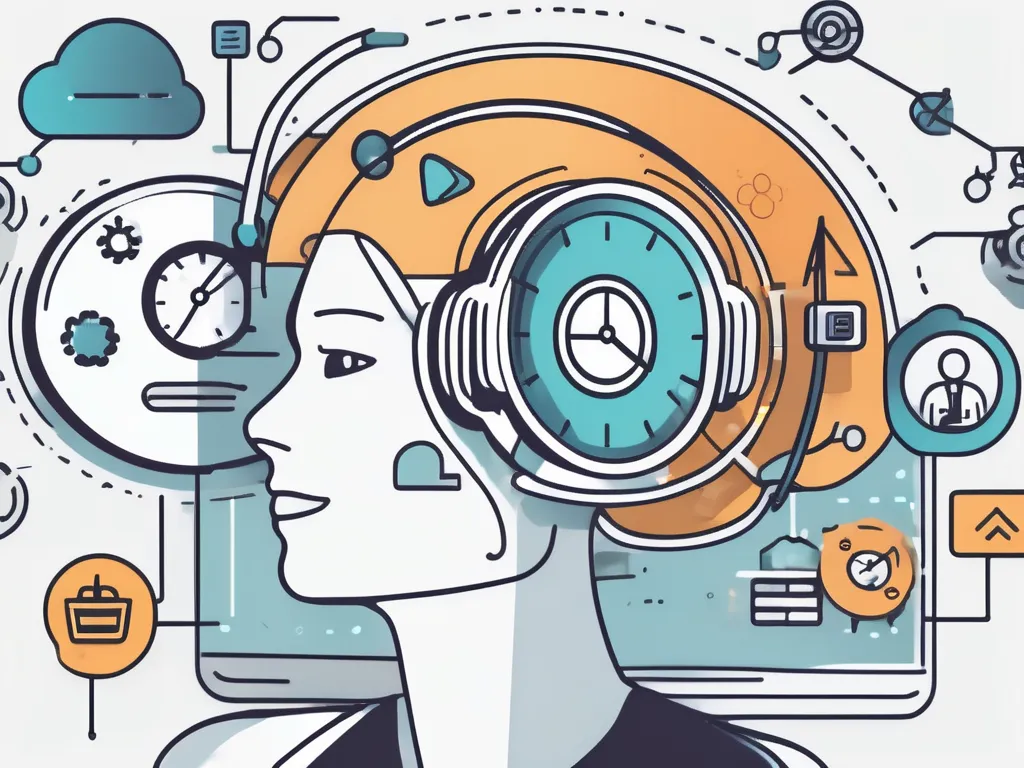Chatbots have significantly transformed the way businesses interact with their customers, revolutionizing the customer experience landscape. With their advanced capabilities and seamless integration, chatbots have become indispensable tools for enhancing customer satisfaction and loyalty. In this article, we will delve into the role of chatbots in business and explore how they improve customer experience.
Understanding the Role of Chatbots in Business
Defining Chatbots and Their Functionality
Firstly, let's define what chatbots are and how they function. Chatbots are AI-powered computer programs designed to simulate human conversation. They utilize natural language processing (NLP) algorithms to interpret user inputs and generate appropriate responses. This technology enables chatbots to engage in text-based or voice-based interactions, providing instant assistance and resolving customer queries.Imagine a scenario where a customer visits an e-commerce website and has a question about a product. Instead of waiting for a customer service representative to respond, the chatbot instantly provides the necessary information, guiding the customer through the purchasing process. This not only saves time but also enhances the overall customer experience.
The Evolution of Chatbots in the Digital Age
The evolution of chatbots has been remarkable. From basic rule-based chatbots to the recent advancements in machine learning, these virtual assistants have become more intelligent and intuitive. Thanks to the advancements in artificial intelligence and natural language understanding, chatbots can now comprehend complex user queries and respond accordingly. This evolution has paved the way for their widespread adoption across various industries.Let's take a look at the banking sector, for example. Chatbots have revolutionized customer service in this industry by providing round-the-clock support. Customers can now easily check their account balance, transfer funds, or even apply for loans through a simple conversation with a chatbot. This not only saves time for the customers but also reduces the workload for the bank's customer service team, allowing them to focus on more complex issues.Furthermore, chatbots have also made a significant impact in the healthcare industry. They can assist patients in scheduling appointments, providing basic medical advice, and even monitoring their health conditions. This level of accessibility and convenience has transformed the way healthcare services are delivered, ensuring that patients receive timely and accurate information.
The Intersection of Chatbots and Customer Experience
The Impact of Chatbots on Customer Interaction
Chatbots have revolutionized the way businesses interact with their customers. By offering instant and personalized responses, chatbots deliver excellent customer service in real-time. Gone are the days of waiting on hold or long response times; chatbots are available 24/7 to address customer queries promptly. This seamless interaction fosters a positive customer experience, enhancing satisfaction levels and ultimately driving customer loyalty.
How Chatbots Facilitate 24/7 Customer Service
The availability of round-the-clock customer service is crucial in today's fast-paced world. Chatbots excel at delivering uninterrupted support, regardless of the time zone or business hours. Through their ability to handle multiple customer queries simultaneously, chatbots ensure that no customer is left unattended, even during peak hours. This round-the-clock support significantly enhances customer satisfaction and fosters a sense of reliability.Furthermore, chatbots are not only limited to addressing customer queries; they can also provide valuable information and assistance in a variety of areas. For instance, chatbots can offer personalized product recommendations based on customer preferences and previous purchases. By analyzing customer data and utilizing machine learning algorithms, chatbots can accurately suggest products that align with each customer's unique tastes and needs. This level of personalized assistance enhances the overall customer experience and increases the likelihood of repeat purchases.In addition to personalized recommendations, chatbots can also assist customers with troubleshooting common issues. Whether it's a technical problem with a product or a question about a specific feature, chatbots can provide step-by-step instructions or direct customers to relevant resources. This not only saves customers time and frustration but also reduces the workload on customer support teams, allowing them to focus on more complex issues that require human intervention.
The Benefits of Implementing Chatbots for Customer Experience
Enhancing Customer Engagement with Chatbots
Customer engagement is a vital aspect of a successful business. Chatbots act as effective engagement tools, providing personalized and interactive experiences. By understanding customer preferences and previous interactions, chatbots can tailor their responses to meet individual needs. This personalized approach helps create a more meaningful and engaging customer experience, resulting in increased satisfaction and brand loyalty.Imagine a scenario where a customer visits an online store and is greeted by a chatbot that remembers their previous purchases and offers personalized recommendations based on their preferences. The chatbot engages the customer in a conversation, asking about their specific needs and providing real-time assistance. This level of personalization not only enhances customer satisfaction but also increases the likelihood of repeat purchases and positive word-of-mouth referrals.Furthermore, chatbots can simulate human-like conversations, making customers feel like they are interacting with a real person. They can use natural language processing to understand and respond to customer inquiries in a conversational manner. This human-like interaction creates a sense of comfort and familiarity, making customers more likely to engage and share their feedback or concerns.
Streamlining Customer Support with Chatbots
Efficient customer support is essential for maintaining high customer satisfaction levels. Chatbots excel at streamlining support processes, automating repetitive tasks, and providing quick solutions. By resolving frequently asked questions, chatbots free up human agents to handle more complex issues, reducing customer wait times and ensuring faster resolutions. This increased efficiency leads to improved customer satisfaction and overall experience.Consider a situation where a customer encounters an issue with a product and seeks support from a company's customer service team. Instead of waiting for a human agent to become available, the customer can interact with a chatbot that is equipped with a vast knowledge base of common issues and their solutions. The chatbot can guide the customer through troubleshooting steps, provide relevant resources, or even escalate the issue to a human agent if necessary. This streamlined support process not only saves time but also reduces frustration and enhances the overall customer experience.Moreover, chatbots can operate 24/7, ensuring round-the-clock support for customers in different time zones or those who prefer to seek assistance outside of regular business hours. This availability eliminates the need for customers to wait until the next working day to get their issues resolved, further improving customer satisfaction and loyalty.
Overcoming Challenges in Chatbot Implementation
Addressing Common Misconceptions About Chatbots
While chatbots offer numerous benefits, businesses often face misconceptions and concerns when implementing them. Addressing these concerns is crucial for successful integration. It is essential to educate customers and employees about chatbot capabilities, ensuring transparency in the interactions. By setting realistic expectations and providing clear guidelines, businesses can overcome skepticism and gain trust in chatbot technology.
Strategies for Successful Chatbot Integration
Integrating chatbots seamlessly into existing systems and workflows requires careful planning and implementation strategies. Businesses must define the chatbot's scope, establish communication channels, and continually train the AI algorithms to improve performance. It's also important to monitor and analyze customer interactions to identify areas of improvement and enhance the chatbot's effectiveness. By following a structured approach, businesses can ensure a smooth chatbot integration process.One of the key challenges in chatbot implementation is ensuring that the chatbot understands and responds accurately to user queries. Natural language processing (NLP) algorithms play a crucial role in enabling chatbots to comprehend and interpret human language. These algorithms analyze the context, syntax, and semantics of user input to generate appropriate responses. However, training NLP models requires a large amount of data and continuous refinement to enhance accuracy.Another challenge businesses face is maintaining a consistent and personalized user experience across different communication channels. Chatbots need to be integrated seamlessly into various platforms such as websites, mobile apps, and social media platforms. This requires careful consideration of the user interface design, ensuring that the chatbot's appearance and behavior align with the overall branding and user expectations. Additionally, businesses must ensure that the chatbot's responses are tailored to each channel, providing relevant and context-specific information.
The Future of Chatbots in Customer Experience
Emerging Trends in Chatbot Technology
The chatbot landscape continues to evolve, driven by advancements in technology and customer expectations. One such emerging trend is the integration of Rich Communication Services message into chatbot platforms. RCS messaging offers enhanced features such as rich media, real-time feedback, and interactive experiences, taking customer engagement to the next level. Chatbots combined with RCS messaging have the potential to create highly engaging and immersive customer experiences.Imagine a scenario where a customer is browsing an online store and has a question about a product. Instead of having to navigate through multiple pages or wait for a customer service representative to respond, they can simply chat with a chatbot that is integrated with RCS messaging. The chatbot can provide real-time product recommendations, showcase interactive product demos, and even allow the customer to make a purchase directly within the chat interface. This seamless and immersive experience not only saves time but also enhances customer satisfaction and increases the likelihood of a successful sale.
Predictions for Chatbots and Customer Service
The future of chatbots in customer experience looks promising. As chatbot technology continues to mature, we can expect more natural language processing capabilities, improved contextual understanding, and increased personalization. Moreover, chatbots will likely see wider adoption across various industries, playing a central role in delivering exceptional customer service and elevating overall customer experience.One exciting prediction for the future of chatbots is their integration with augmented reality (AR) technology. Imagine a customer who wants to try on a pair of sunglasses before making a purchase. With an AR-enabled chatbot, the customer can simply upload a photo of themselves and virtually try on different styles of sunglasses, all within the chat interface. This not only enhances the customer's shopping experience but also reduces the need for physical try-ons, making the purchasing process more convenient and efficient.In conclusion, chatbots have revolutionized the way businesses interact with their customers, significantly improving the customer experience landscape. With their ability to provide instant and personalized support, chatbots enhance customer engagement, streamline support processes, and overcome time constraints. The integration of emerging technologies like RCS messaging and augmented reality further enhances chatbots' capabilities, promising a future where highly engaging and immersive customer experiences become the norm. As businesses continue to leverage chatbots in their customer service strategies, the benefits for both businesses and customers are set to grow exponentially.

